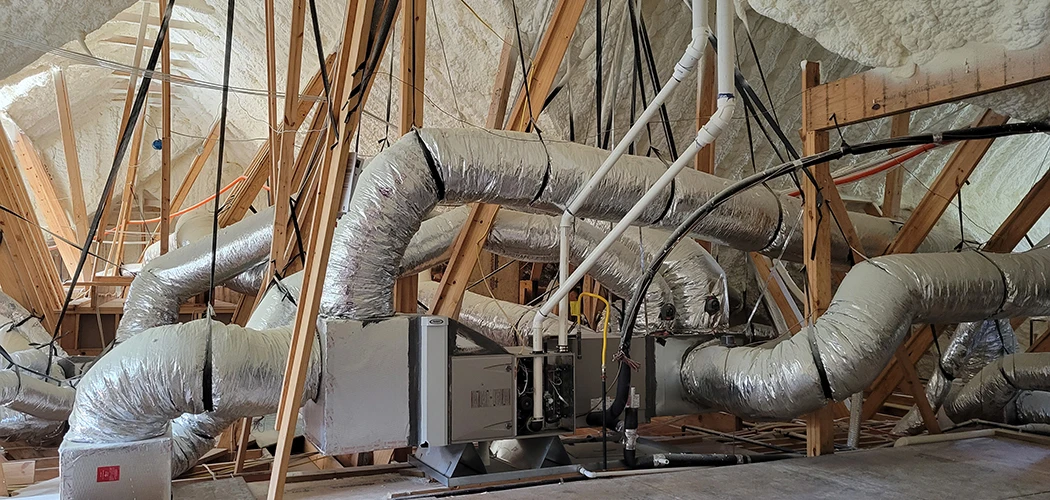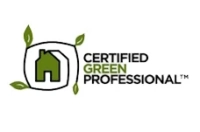Foam Insulation: A Consideration for Your Houston Custom Home
The Role of Insulation in Custom Homes
Insulation is one of the most critical energy efficiency components in a home, especially in a climate like Houston’s, where managing indoor temperature and humidity is essential. Choosing the right insulation can significantly impact your home’s energy efficiency, comfort, and overall performance. Foam insulation has emerged as a popular choice for custom homes due to its many benefits over traditional insulation materials.

The Benefits of Foam Insulation
Energy Efficiency
Foam insulation excels at reducing energy consumption by creating an effective insulating barrier. Foam insulation has R-values between 3.5 and 7 per inch. An “R-value” is a materials resistance to heat flow. The higher the R-value, the more energy efficient the material. In Houston’s hot and humid climate, maintaining a stable indoor temperature can be challenging, but foam insulation helps keep your home cool in the summer and warm in the winter, reducing the need for excessive heating and cooling.
Air Sealing
One of the standout features of foam insulation is its ability to seal air leaks. Unlike other insulation types, foam expands to fill gaps and cracks, preventing drafts and ensuring that conditioned air stays inside your home. This air sealing capability is particularly beneficial in Houston, where high humidity and heat can put extra strain on HVAC systems.
Attic Storage
Attics sealed with foam insulation are considered “semi-conditioned”. The temperature of a foam insulated attic is typically within 10 degrees of the living area beneath it. This allows homeowners with sealed attics to store temperature sensitive items in their attics.
Indoor Air Quality
A home with an attic sealed with foam insulation will have less dust and allergens than a home with a ventilated attic that encourages airflow. Ventilated attics rely on outdoor air intake and exhaust which creates air circulation. This circulation assist with cooling ventilated attics but this process allows dusts, pollens, and other airborne debris to enter the attic and potentially ending up in the house.
Sound Mitigation
Foam insulation also offers excellent soundproofing qualities, making your home quieter and more comfortable. Whether you’re trying to block out the noise from a busy Houston street or simply want to create a more peaceful indoor environment, foam insulation helps reduce noise transmission through walls, floors, and ceilings.
Exploring Types of Foam Insulation
Open-Cell Foam
Open-cell foam insulation is less dense and more flexible than its closed-cell counterpart. It’s also more affordable. Open-cell foam insulation the primary exterior wall and attic insulation choice for homeowners building custom homes in Houston. It can also be used for interior applications, such as walls and ceilings, where soundproofing and some level of insulation are required.
Closed-Cell Foam
Closed-cell foam is denser and more rigid, offering higher R-values and better moisture resistance than open-cell foam. This type of insulation is ideal for crawlspace applications, providing a strong air and moisture barrier It’s also commonly used in temperature controlled wine rooms because of its high R-value and properties as a vapor barrier.
Cost Considerations
Foam insulation typically comes with a higher upfront cost compared to other insulation types, but the long-term energy savings and added benefits often outweigh the initial investment. The cost of foam insulation can vary based on the type (open-cell or closed-cell), the size of the area being insulated, and the complexity of the installation. However, in a city like Houston, where energy efficiency is crucial, the return on investment can be substantial.
Comparing Foam Insulation to Other Insulation Types
Fiberglass
Fiberglass insulation is a more traditional option and is often less expensive than foam. However, it doesn’t provide the same level of air sealing or moisture control as foam insulation, making it less effective in Houston’s humid environment.
Cellulose
Cellulose insulation is made from recycled materials and is an eco-friendly choice. While it offers good thermal performance, it doesn’t match the air sealing capabilities of foam insulation. In Houston, where air leaks can lead to significant energy loss, foam insulation is often a better choice.
Mineral Wool
Mineral wool is known for its fire resistance and soundproofing qualities. It’s a solid insulation choice, but like fiberglass and cellulose, it lacks the air sealing and moisture control benefits that foam insulation provides, which are particularly valuable in Houston.
Building Your Houston Home with Confidence
At Built Green Custom Homes, we understand the unique challenges that come with building a custom home in Houston’s climate. We are here to guide you in selecting the best insulation for your project, ensuring your home remains energy-efficient and comfortable year-round. Our Free Building Classes provide valuable information on insulation types, installation techniques, and other critical building decisions.
We offer Owner Builder Financing options to help you invest in high-quality materials like foam insulation. With our detailed building schedules and comprehensive construction manuals, you’ll have all the tools you need to stay on track and achieve your vision. Contact us today to learn how we can support you in building a smarter, more efficient home in Houston.
Frequently Asked Questions
Is foam insulation worth the higher cost compared to other insulation types?
While foam insulation has a higher upfront cost, its superior energy efficiency, air sealing, and moisture control often result in significant long-term savings on energy bills, making it a worthwhile investment, especially in Houston’s demanding climate.
Can foam insulation help reduce noise in my home?
Yes, foam insulation offers excellent soundproofing properties. Open-cell foam, in particular, is effective at absorbing sound, making it a good choice for homes in noisy areas or for rooms where sound control is important.
How long does foam insulation last?
Foam insulation is known for its durability and can last for decades without significant degradation. It maintains its insulating properties over time, ensuring consistent performance throughout the life of your home.
What are the environmental impacts of foam insulation?
While foam insulation is not as eco-friendly as some other options like cellulose and mineral wool, its energy-saving benefits can offset its environmental impact over time. Additionally, many manufacturers now offer low-VOC and environmentally conscious foam products.
Questions? Comments? Contact Us for more information


 Free Building Classes
Free Building Classes




